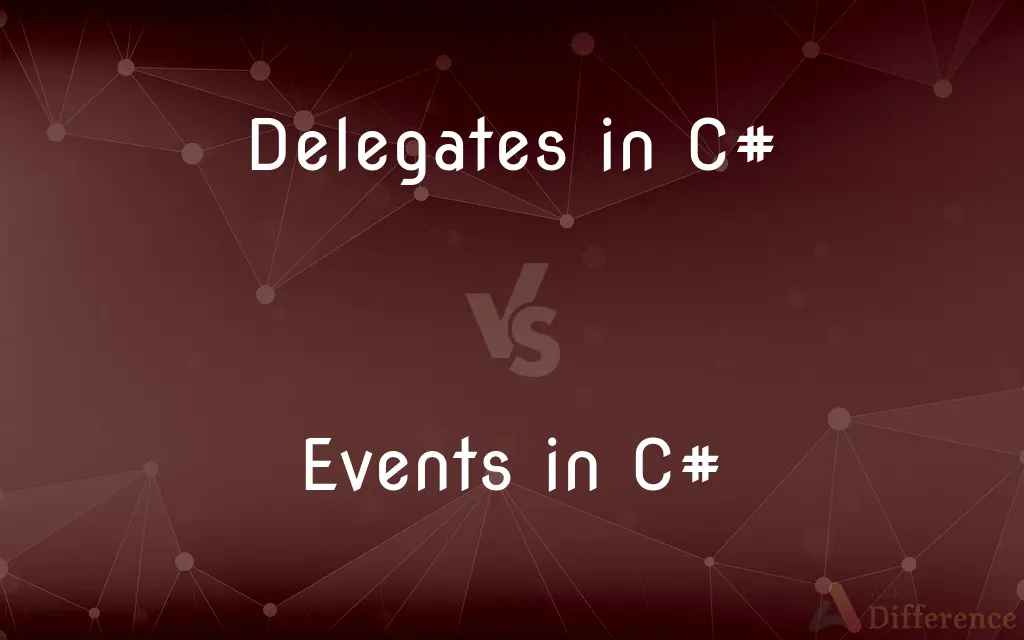Delegates in C# vs. Events in C# — What's the Difference?
By Tayyaba Rehman — Published on January 12, 2024
Delegates in C# are type-safe pointers to methods, while events are a way to provide notifications, utilizing delegates for invocation.

Difference Between Delegates in C# and Events in C#
Table of Contents
ADVERTISEMENT
Key Differences
Delegates in C# are objects that reference one or more methods. They are similar to function pointers in other languages but are type-safe and secure. Events in C#, on the other hand, are members that use delegates to attach and detach event handlers, providing a way to handle events like user actions or messages from other programs.
Delegates are flexible and can be used to implement callback mechanisms. They can point to static or instance methods. Events use delegates internally and act as a layer of abstraction. They are used to publish notifications that something of interest has occurred in the system.
In C#, delegates can be chained together; for instance, a single delegate can invoke multiple methods. Events control the distribution of messages and are typically used to subscribe to and unsubscribe from notifications. They prevent the event consumers from directly invoking the event publisher's methods.
Delegates in C# are powerful constructs that can be passed around just like objects since they are reference types. Events restrict this flexibility intentionally; they can only be invoked by the class that declares them, providing a controlled mechanism of broadcasting information to listeners.
While delegates can be invoked by any code that has access to them, which can lead to less predictable code execution, events enforce encapsulation and can be thought of as a strict contract. This contract ensures that only the owning class can raise the event, leading to a more structured and predictable execution flow.
ADVERTISEMENT
Comparison Chart
Definition
Objects that can reference methods.
Mechanisms for broadcasting and handling notifications.
Usage
Can be used anywhere a method call is needed.
Used specifically for event notification patterns.
Access Control
Can be invoked by any accessor.
Can only be raised by the class that declares them.
Invocation
Can directly invoke methods.
Use delegates to indirectly invoke methods.
Flexibility
Highly flexible and can be reused.
Designed for a specific purpose with controlled access.
Compare with Definitions
Delegates in C#
Delegates can reference and invoke methods.
The delegate processed the data using an assigned method.
Events in C#
Events are designed to be handled by event handlers.
The form's Closed event is handled by a specific event handler.
Delegates in C#
Delegates can reference multiple methods simultaneously.
This delegate multicasts to several event handler methods.
Events in C#
Events manage subscribers for notifications.
We added a new subscriber to the event for handling user input.
Delegates in C#
Useful for creating callback mechanisms.
I used a delegate for the callback to handle asynchronous results.
Events in C#
Events enable a publish-subscribe model.
The button's Click event notifies all subscribed event handlers.
Delegates in C#
Delegates provide type-safe method invocations.
Type safety in delegates ensures the method signatures match.
Events in C#
Events encapsulate the event-raising mechanism.
Only the object owning the event can trigger it, ensuring encapsulation.
Delegates in C#
Delegates can be chained for combined execution.
Delegate chaining allowed for multiple methods to be called in order.
Events in C#
Events provide a notification system for objects.
The event alerted subscribers of a state change.
Common Curiosities
Can you invoke a delegate directly?
Yes, a delegate can be invoked just like a method if you have access to it.
Can events be invoked like delegates?
No, events can only be raised by the class that declares them.
Why use events instead of calling delegates directly?
Events provide a more structured and encapsulated way of handling notifications.
Are events and delegates interchangeable?
No, they serve different purposes; events provide a higher-level abstraction over delegates.
What is a delegate in C#?
A delegate is a type-safe reference to a method.
How do events use delegates?
Events use delegates to point to methods that are called when the event occurs.
Do events support multicast delegates?
Yes, events can multicast and notify multiple subscribed delegates when raised.
Can you unsubscribe from an event?
Yes, you can unsubscribe using the -= operator.
Can an event have multiple subscribers?
Yes, events can have multiple methods subscribed to them.
Can delegates be chained?
Yes, delegates can be combined to call multiple methods.
Are delegates only used for events?
No, delegates can be used independently of events for callbacks, threading, and more.
What happens if you raise an event with no subscribers?
If an event has no subscribers, raising it has no effect.
How do you subscribe to an event?
You can subscribe using the += operator and an event handler method.
Can delegates be null?
Yes, a delegate can be null if it hasn't been assigned any method references.
Is it necessary to use delegates with events?
Yes, events rely on delegates to specify the method signature of the event handlers.
Share Your Discovery

Previous Comparison
Joint Venture vs. Strategic Alliance
Next Comparison
Mendel’s First law vs. Mendel’s Second LawAuthor Spotlight
Written by
Tayyaba RehmanTayyaba Rehman is a distinguished writer, currently serving as a primary contributor to askdifference.com. As a researcher in semantics and etymology, Tayyaba's passion for the complexity of languages and their distinctions has found a perfect home on the platform. Tayyaba delves into the intricacies of language, distinguishing between commonly confused words and phrases, thereby providing clarity for readers worldwide.
















































